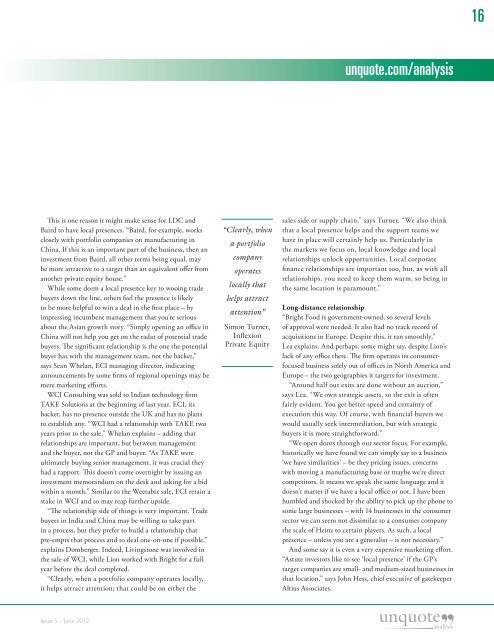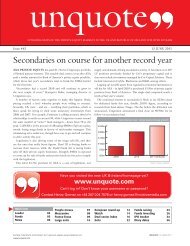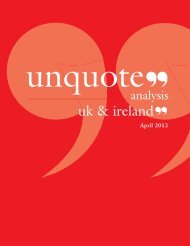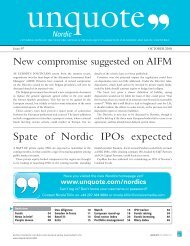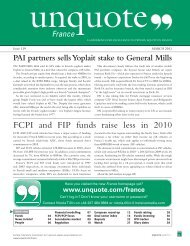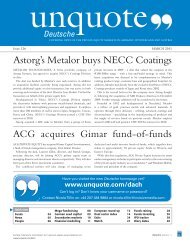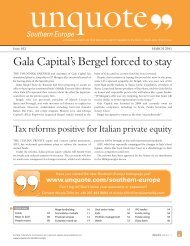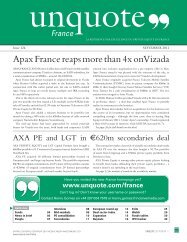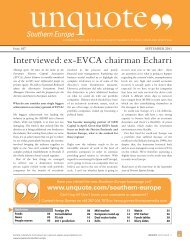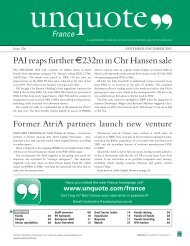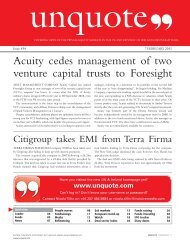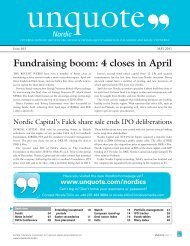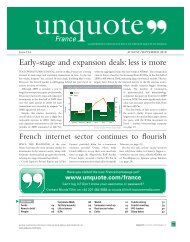Firstly, Lion Capital acquired eyewear retailer Alain Afflelou - Unquote
Firstly, Lion Capital acquired eyewear retailer Alain Afflelou - Unquote
Firstly, Lion Capital acquired eyewear retailer Alain Afflelou - Unquote
Create successful ePaper yourself
Turn your PDF publications into a flip-book with our unique Google optimized e-Paper software.
16<br />
unquote.com/analysis<br />
This is one reason it might make sense for LDC and<br />
Baird to have local presences. “Baird, for example, works<br />
closely with portfolio companies on manufacturing in<br />
China. If this is an important part of the business, then an<br />
investment from Baird, all other terms being equal, may<br />
be more attractive to a target than an equivalent offer from<br />
another private equity house.”<br />
While some deem a local presence key to wooing trade<br />
buyers down the line, others feel the presence is likely<br />
to be more helpful to win a deal in the first place – by<br />
impressing incumbent management that you’re serious<br />
about the Asian growth story. “Simply opening an office in<br />
China will not help you get on the radar of potential trade<br />
buyers. The significant relationship is the one the potential<br />
buyer has with the management team, not the backer,”<br />
says Sean Whelan, ECI managing director, indicating<br />
announcements by some firms of regional openings may be<br />
mere marketing efforts.<br />
WCI Consulting was sold to Indian technology firm<br />
TAKE Solutions at the beginning of last year. ECI, its<br />
backer, has no presence outside the UK and has no plans<br />
to establish any. “WCI had a relationship with TAKE two<br />
years prior to the sale,” Whelan explains – adding that<br />
relationships are important, but between management<br />
and the buyer, not the GP and buyer. “As TAKE were<br />
ultimately buying senior management, it was crucial they<br />
had a rapport. This doesn’t come overnight by issuing an<br />
investment memorandum on the desk and asking for a bid<br />
within a month.” Similar to the Weetabix sale, ECI retain a<br />
stake in WCI and so may reap further upside.<br />
“The relationship side of things is very important. Trade<br />
buyers in India and China may be willing to take part<br />
in a process, but they prefer to build a relationship that<br />
pre-empts that process and to deal one-on-one if possible,”<br />
explains Domberger. Indeed, Livingstone was involved in<br />
the sale of WCI, while <strong>Lion</strong> worked with Bright for a full<br />
year before the deal completed.<br />
“Clearly, when a portfolio company operates locally,<br />
it helps attract attention; that could be on either the<br />
“Clearly, when<br />
a portfolio<br />
company<br />
operates<br />
locally that<br />
helps attract<br />
attention”<br />
Simon Turner,<br />
Inflexion<br />
Private Equity<br />
sales side or supply chain,” says Turner. “We also think<br />
that a local presence helps and the support teams we<br />
have in place will certainly help us. Particularly in<br />
the markets we focus on, local knowledge and local<br />
relationships unlock opportunities. Local corporate<br />
finance relationships are important too, but, as with all<br />
relationships, you need to keep them warm, so being in<br />
the same location is paramount.”<br />
Long-distance relationship<br />
“Bright Food is government-owned, so several levels<br />
of approval were needed. It also had no track record of<br />
acquisitions in Europe. Despite this, it ran smoothly,”<br />
Lea explains. And perhaps, some might say, despite <strong>Lion</strong>’s<br />
lack of any office there. The firm operates its consumerfocused<br />
business solely out of offices in North America and<br />
Europe – the two geographies it targets for investment.<br />
“Around half our exits are done without an auction,”<br />
says Lea. “We own strategic assets, so the exit is often<br />
fairly evident. You get better speed and certainty of<br />
execution this way. Of course, with financial buyers we<br />
would usually seek intermediation, but with strategic<br />
buyers it is more straightforward.”<br />
“We open doors through our sector focus. For example,<br />
historically we have found we can simply say to a business<br />
‘we have similarities’ – be they pricing issues, concerns<br />
with moving a manufacturing base or maybe we’re direct<br />
competitors. It means we speak the same language and it<br />
doesn’t matter if we have a local office or not. I have been<br />
humbled and shocked by the ability to pick up the phone to<br />
some large businesses – with 14 businesses in the consumer<br />
sector we can seem not dissimilar to a consumer company<br />
the scale of Heinz to certain players. As such, a local<br />
presence – unless you are a generalist – is not necessary.”<br />
And some say it is even a very expensive marketing effort.<br />
“Astute investors like to see ‘local presence’ if the GP’s<br />
target companies are small- and medium-sized businesses in<br />
that location,” says John Hess, chief executive of gatekeeper<br />
Altius Associates.<br />
Issue 5 – June 2012


